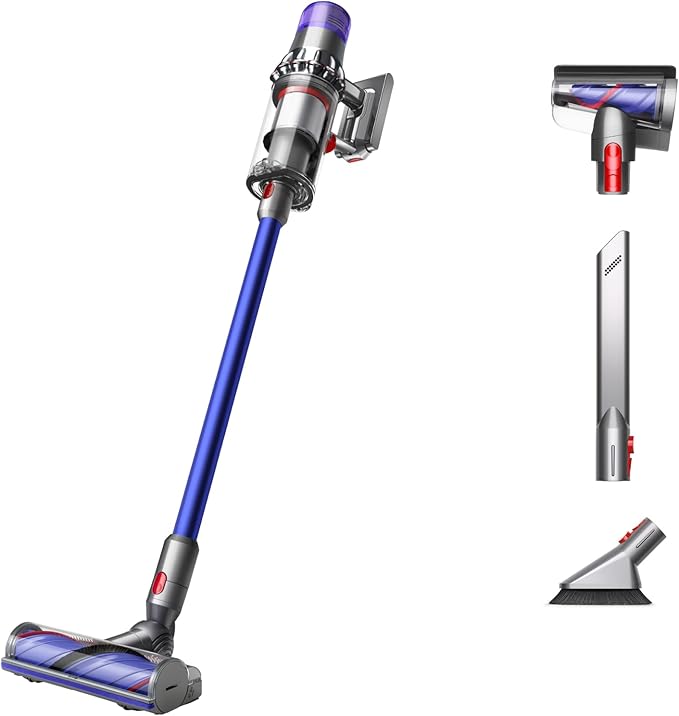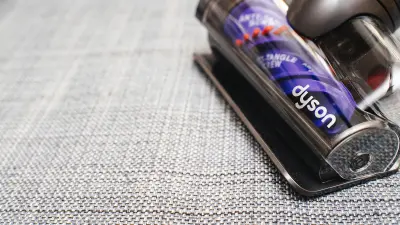The day I got my first Dyson vacuum was the best day ever. I vacuumed every corner of the house, totally satisfied as dust and grime filled up the Dyson canister. My floors had never felt so clean, and I was hooked. Talk about a major upgrade from my broom and dust pan.
We’ve had our Dyson V8 for almost SEVEN years, and it’s still going strong. But we recently decided to upgrade to the Dyson V11 for more power and longer battery life. Instead of replacing it, we moved the V8 downstairs and kept the V11 upstairs.
In this post, I’ll walk you through the key differences between the Dyson V8 and V11, based on real-life experience as a mom managing a busy household. Whether you’re tackling toddler (and/or let’s face it, teenager) crumbs, pet hair, or deep carpet cleans, this comparison will help you decide which Dyson cordless vacuum is the best fit for your home.
Overview: Dyson V11 vs V8 at a Glance
Key Differences Between the Dyson V11 and V8
These vacuums differ significantly in suction strength, battery life, and smart features.
The V11 delivers up to 185 air watts of suction power—a big jump from the V8’s 115, making it better suited for deep cleaning carpets and larger messes.
The V11 also offers up to 60 minutes of run time (compared to the V8’s 40 minutes) and features an LCD screen that shows battery life, cleaning modes, and maintenance alerts. (The LCD screen is cool, but not necessarily a feature that puts it over the top)
One of the biggest upgrades in the V11 is its auto-adjusting suction that adapts to different floor types, something the V8 doesn’t offer. If you’re looking for smarter performance and more power for a bigger space or a busy household, the V11 stands out. But if you want something lighter and more budget-friendly for quick everyday cleanups, the V8 still holds its own.
Suction Power and Cleaning Performance
Here’s where I noticed a big jump.
When it comes to suction, the Dyson V11 is a clear winner. With up to 185 air watts of suction power, it’s nearly 60% more powerful than the Dyson V8, which maxes out at 115 air watts.
It’s almost like running the V8 on “MAX” mode all the time (which I love). If you run the Dyson V8 on “MAX” you typically burn the battery out in a few minutes and need to recharge.
That extra power makes a noticeable difference on thick carpets, rugs, and messes that require deep cleaning, like ground-in crumbs or pet hair.
The V8 still performs well on hard floors and low- to medium-pile carpets, but for families with pets, kids, or lots of high-traffic areas, the V11 delivers a more thorough and efficient clean.
The first time we used the V11, we were blown away by how much it picked up in a small space. The V11 is truly supercharged in terms of suction and performance!
Battery Life and Charge Time
If you’re tired of your vacuum dying mid-clean, the Dyson V11 is an upgrade in the battery department. It offers up to 60 minutes of run time in Eco mode, depending on the tool and floor type. In comparison, the Dyson V8 gives you about 40 minutes—still solid, but not quite enough for larger homes or full-house cleanings.
The V11 also features three cleaning modes (Eco, Auto, and Boost), allowing you to balance power and battery life more efficiently. Both models take around 4.5 to 5 hours to fully recharge.
If your battery life has ever died mid-clean, you know what a bummer it is to wait for your vacuum to recharge (especially if you were in “MAX” mode on the V8).
Weight, Ease of Use, and Noise Level
These issues don’t weigh too heavily on my mind. If anything, my complaint for both vacuums revolves around having to hold the trigger the entire time when operating (which can give you a blister).
The Dyson V8 is the lighter of the two, weighing in at 5.75 lbs, making it easier to maneuver, carry up and down stairs, or hand off to a tween for chore duty.
The Dyson V11 is slightly heavier at 6.68 lbs, due to its larger motor and LCD screen, but still very manageable for most users.
In terms of noise level, the V11 is noticeably quieter, thanks to improved motor acoustics and airflow design. Both models are cordless and convert easily into handheld mode.
Price Comparison: Is the Dyson V11 Worth the Extra Money?
When comparing the Dyson V11 and V8, price is often the deciding factor, especially for budget-conscious moms.
Whether you are getting the V11 or the V8, watch for sales (especially on Prime Day and around the holidays).
Dyson V11
- MSRP typically ranges from $550 to $600. On Dyson’s official site, the V11 is currently listed at $569.99.
- We’ve seen Amazon deals dropping the price to around $470.
Dyson V8
- MSRP sits around $400–$500, depending on the bundle. Best Buy currently lists the V8 at $349.99 (marked down from $469.99)
- Amazon’s ongoing sale offers the V8 Plus for $350 (a $120 discount)
How Long Should the Dyson V11 and V8 Last?
Let’s face it. You are getting into a long-term relationship with this vacuum. Make sure you choose the one that’s right for you! Here’s what you can expect:
Battery Life and Warranty
Both the V8 and V11 use lithium-ion batteries, which naturally degrade over time. Dyson batteries are replaceable, and replacements typically cost $75–$150, depending on the model. If you clean the filter regularly and avoid running the vacuum until it’s fully drained every time, you’ll help extend the battery’s lifespan.
Here’s what your warranty covers:
- First 24 months: If your vacuum suddenly loses battery life or won’t charge, Dyson will replace the battery at no cost, beyond regular wear and tear.
- After 2 years: You can still buy an official Dyson replacement battery. It’s typically priced between $75–$150 and includes a 1-year warranty on that battery part.
Final Verdict: The Best Dyson Vacuum for Your Home
Vacuuming might just be my favorite chore—there’s nothing more satisfying than seeing all the dust and debris disappear in real time.
With the Dyson V8, I often found myself using MAX mode to get that extra bit of power. The Dyson V11 fills that gap. It delivers stronger suction, longer run time, and smarter features that make everyday cleaning easier and more effective.
While it does cost a bit more upfront, the performance boost—and the fact that these vacuums can last for years—makes it a worthwhile investment for any busy household.
Don’t get me wrong, you really can’t go wrong with a Dyson. My V8 has just been relegated to the basement (still got plenty of life left), but a new winner is living upstairs!
WINNER: Dyson V11










Leave a Reply